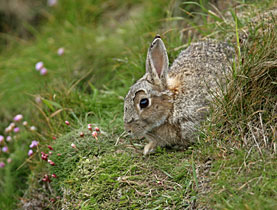Sounding the alarm over mammal loss

A quarter of all the world's land mammals and a third of all marine mammals are under threat, according to a study released on Monday.
The report was drawn up for the Swiss-based International Union for the Conservation of Nature (IUCN) and presented at the world conservation congress in the Spanish city of Barcelona.
The research team compiled data on 5,487 mammalian species, many of them for the first time. The experts found that 1,141 of them are in danger of extinction.
The threat to the land species arises principally from habitat loss and hunting and gathering, while marine mammals are mainly affected by pollution and the indirect effects of fishing, the study says.
The IUCN congress will be looking at the problem of sustainable development, including how to safeguard biodiversity and how to meet economic needs without sacrificing nature.
The protection of animal and plant species is a worldwide issue.
Switzerland’s biodiversity
In the past 150 years 224 animal and plant species have disappeared in Switzerland. More than one third of the country’s flora and fauna are on the red list of endangered species, with reptiles and amphibians being most at risk.
The Swiss section of WWF thinks the government isn’t doing enough to protect endangered species living in Switzerland.
Among the species under threat are the bear, lynx, wolf, and red deer. Even the European rabbit is declining, and is now described as “near threatened”, yet hunting of them is still allowed.
Switzerland has lagged behind in producing a biodiversity strategy, Walter Vetterli of WWF Switzerland told swissinfo. Even now, the government has only agreed to look at the issue under pressure from parliament, he said.
Drawing up such a strategy is part of Switzerland’s international obligations as a member of the international convention on biodiversity.
If the environment was high on ordinary people’s priorities in the 1990s, it was subsequently replaced by concern about jobs and security. But worries about climate change in particular have changed perceptions.
“We can see that the environment is becoming an important issue again,” Vetterli said. “But budget cuts have had a serious impact on the ability of cantons to implement their projects and strategies.”
Willy Geiger, of the Swiss Environment Office, who is leading the Swiss delegation to the IUCN conference, admits that biodiversity has not always been a top priority, but believes that things are now beginning to move.
But he points out that Switzerland is densely populated, which puts pressure on the amount of suitable space available for endangered species.
“There’s a huge discussion going on with the forestry and agricultural sectors to find the square kilometres we need to guarantee the long term survival of these species,” he explained.
Networking opportunity
As for the IUCN conference in Barcelona, Geiger said that Switzerland was not putting forward any motions of its own, but had carefully studied the 156 that were up for discussion.
“The most important cover the protection of highly endangered animal and plant species, and we have a very particular interest in the indigenous populations who live in protected areas,” he said.
“Of course we can’t have a direct influence from Switzerland, but the IUCN can. It is in contact with many governments. We can give our expertise in the creation of natural parks and the bottom-up approach we use in Switzerland.”
The IUCN conference started on Sunday and runs until October 14. It is a very prestigious event, with its initial meetings attended by representatives of governments, business and non-governmental organisations and even by some royalty and heads of state.
The opening address was delivered by Ted Turner, founder of CNN. The forum, which takes place over the first four days, is a public gathering with more than 800 events scheduled, including debates, workshops, training courses and exhibitions.
The members’ assembly starts on Friday, and will discuss ICUN business, and the motions that have been submitted.
It’s a hectic occasion, but a useful one, Geiger believes.
“It’s an opportunity to biologists and conservationists from all over the world together to compare strategies, to make contacts and to network.”
swissinfo, Julia Slater
The IUCN celebrates its 60th anniversary this year.
Its headquarters are in Gland, near Geneva.
It is the oldest and largest global environmental network in the world with a membership more than 1,000 governmental and non-governmental organisations in 140 countries.
Nearly 11,000 voluntary scientists work for it in six commissions.
It has over 1,000 professional staff in 60 offices around the world.
It holds a World Conservation Congress every four years in a different country.
It has official observer status at the UN General Assembly.
Its aim is to encourage and help societies to conserve nature and to use natural resources in a sustainable way.

In compliance with the JTI standards
More: SWI swissinfo.ch certified by the Journalism Trust Initiative










You can find an overview of ongoing debates with our journalists here . Please join us!
If you want to start a conversation about a topic raised in this article or want to report factual errors, email us at english@swissinfo.ch.